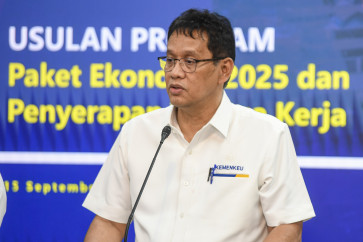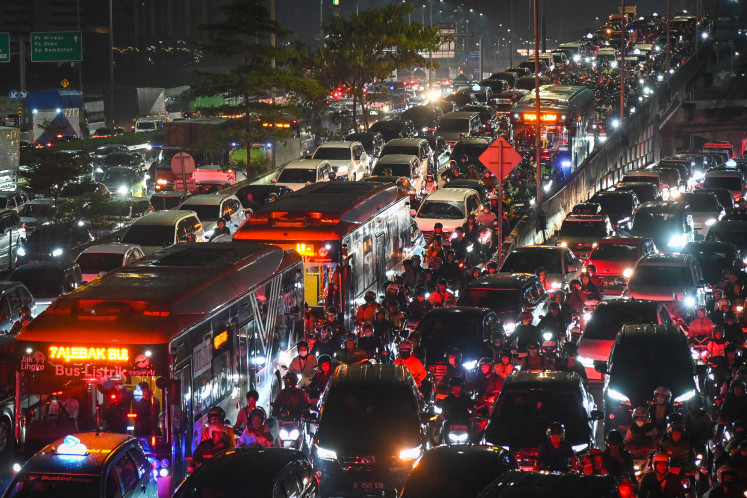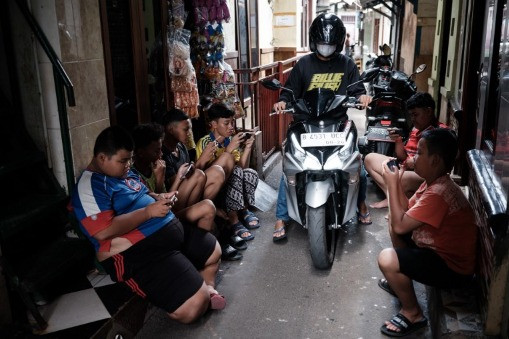Popular Reads
Top Results
Can't find what you're looking for?
View all search resultsPopular Reads
Top Results
Can't find what you're looking for?
View all search resultsProviding indiscriminate health access
On an open-air raised stage by the Senen train station, East Jakarta, young men in tight shirts and jeans sung dangdut songs and shook their hips to the music Saturday night
Change text size
Gift Premium Articles
to Anyone
O
n an open-air raised stage by the Senen train station, East Jakarta, young men in tight shirts and jeans sung dangdut songs and shook their hips to the music Saturday night. Beneath them hundreds of men danced.
It was just a little bit after midnight when Riesma, a transvestite with big eyes and heavy fake lashes, prepared herself to dance with a glass of cheap liquor.
"I feel embarrassed to shake around if I don't drink."
With two friends, Riesma formed a group called Trio Badak (Rhinoceros Trio). Wearing sexy clothes, they danced while men gave them saweran or small change tucked between their cleavages.
The area close to the Senen train station is one of Jakarta's hangouts for gay men and transvestites or waria.
For organizations working in HIV and AIDS prevention, Senen is one of the hot spots for outreach programs targeting transvestites and men who have sex with other men (MSM).
NGOs such as Partisan and Karya Bakti foundation, funded by Family Health International, are reaching out to minority groups and informing them about clinics that serve transvestites, female sex workers and gay men without discrimination.
However, a health bill with religious overtones might jeopardize years of work in providing reproductive health access to the minority groups, a doctor with the Indonesian Family Planning Foundation (PKBI) Clinic, Maya Trisiswati said.
The parliament is currently deliberating a bill that will replace the 1992 health law.
Women and health activists have criticized the bill for including religious values in articles on reproductive health access.
"There are articles in the bill that include religious values, which gives no legal guarantee that health, which is a fundamental right of all people, will only be a health issue without looking at their marital status," said Ratna Batara Munti, from the Network of Pro-Women's National Legislation Program (JKP3).
Maya said that reproductive health care, which includes treatment for sexually transmitted disease, should be universal regardless of marital status or sexual preferences.
FHI officer overseeing HIV and AIDS prevention among MSM, Erlian Rista Aditya, said each person could interpret the bill differently.
"My interpretation of religion can be different to my friends, even though we're both Muslim for example.
"It's fine with having a religious perspective as long as it can help people receive health access and not hamper it."
For FHI the problem of health access for high-risk groups was one of the problems they had to address as they set up the program.
"When we first started in 1994, we focused more on prevention. However, we found that as people were more informed - to take STD tests - they needed health services.
"And at that time, there was no clinic that served the high-risk groups without stigma and discrimination," Erlian Rista Aditya said in his office Tuesday.
FHI and the National Aids Commission (KPA) collaborated with PKBI Clinic in Pisangan, East Jakarta and Jelia Clinic in Mangga Besar, West Jakarta to provide user friendly health access for high-risk groups, since 2002. Erlian said, with the help of KPA, big hospitals, such as Ciptomangunkusumo and Dharmais hospitals, and an addition of eight health posts around Jakarta were now also more user-friendly.
"There are still risks of stigma and discrimination if a waria or a gay man seeks treatment outside of the network we built."
In Jakarta, the prevalence of HIV among transvestites is 34 percent, which meant one out of three transvestites in the city likely has HIV, according to a 2007 survey by the Health Ministry.
For men who have sex with other men, the prevalence is 8.1 percent, or one out of 15.
Riesma said that from NGO campaigns she knew of the risk of contracting sexually transmitted disease from having unprotected sex and has been tested for STD a couple of months back.
"I haven't had another test since."
Alda, who is part of Riesma's Trio Badak, has also carry out voluntary counselling and testing (VCT) at PKBI Clinic. She said the medical workers there did not discriminate against her.
"The medical workers treated me nicely."
Maya said the clinic tried to give an integrated health service for the high-risk groups.
She said that for Rp 10,000 one could get an STD test, VCT, and condoms, as well as lubricants.
"We try to make it comprehensive and also encourage them to protect themselves by giving condoms and lubricants."










